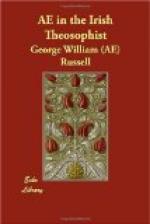In conclusion I may, perhaps, be permitted to give you a few remarks as to the influence Theosophy has had upon myself. It has furnished me with satisfactory reasons for living and working; it has infused an earnestness in that work which I prize as one of the valuable things of my life’s experience. It has ministered to that inmost sense of worship and aspiration which all of us possess; it has shown me that by expanding one’s consciousness in that of the universe, one gains more knowledge and opportunity for helping on humanity; and it has pointed out where the materials for a scientific basis of ethics can be found, and also what will be the outlines of the future building; and finally it has shown that if the objects of our desires be changed, and many things we held dear are no longer prized, it is owning simply to the acquirement of larger and fuller interests.
—September 15, 1894
Comfort
We are continually called upon to give comfort, and it is a problem to many what to say. For there are people who can see no outlet from their pain other than this, that they shall obtain that which they desire. The lover longs for the one who is absent or cold; the poor demand wealth; the tortured cry out for relief from suffering; and so on through all phases of human life we continually meet such people. We, perhaps free from such afflictions, have schooled ourselves into a heroic mood. These are not things to sorrow over, we think; therefore, we are in a dilemma. We cannot aid them, for their ideals often seem ignoble to us—their wish accomplished would only bring on the renewal of old pain, and bind them closer to the weary wheel. Yet we cannot be cold, we who would identify ourselves with all life, for the soul must “lend its ear to every cry of pain, like as the lotus bares its heart to drink the morning sun.” In the many cases where the suffering is unavoidable, and cannot be otherwise received, what are we to do? Some, a little above the ignoble view that the only relief is in the satisfaction of desire, say reverently to those in pain: “It is God’s will,” and some accept it as such with dull resignation. But with some the iron has entered the soul—the words are empty. “What have I to do with God, or He with me?” they demand in their hearts. They join in the immemorial appeal and fierce revolt which at all times the soul of man makes against any external restraint. We who are disciples of old wisdom may touch some chord in them which may awaken eternal endurance.
It is not, we say, a pain imposed upon us by any eternal power; but the path we tread is one which we ourselves very long ago determined. To the question, “What have we to do with God?” we make answer that we are the children of Deity—bright sparks born in the Divine flame, the spirit in its primal ecstacy reflected in itself the multitudinous powers that throng in space. It was nourished by divine




